Brexit's Economic Impact: UK, Iceland, Norway Trade Relations (MD4099)
VerifiedAdded on 2022/09/09
|14
|2999
|16
Essay
AI Summary
This essay critically analyzes the economic impact of Brexit on the UK, Iceland, and Norway, focusing on trade relations, foreign direct investment (FDI) inflows and outflows, and the application of economic theories such as comparative advantage and the OLI paradigm. The analysis begins with an overview of Brexit and the uncertainty it has created, highlighting the trade agreement signed between the UK, Iceland, and Norway to mitigate some of the negative effects. The essay explores how Brexit influences trade and business growth, the impact of uncertainty on business confidence, and the potential for economic slowdown. It examines the reintroduction of custom borders, the advantages and disadvantages of trade, and the potential benefits of the European Economic Area and European Free Trade Area. The essay also investigates the impact of Brexit on FDI, using data from 2008 to 2018 to show net FDI inflows and outflows for the three countries. Finally, the essay assesses the broader implications of Brexit on the global economy, considering the impact on the UK, Iceland, and Norway's GDP growth and the challenges posed to globalization. The essay uses figures and data to support its arguments and provides a comprehensive overview of the economic consequences of Brexit, drawing on academic and commercial sources.
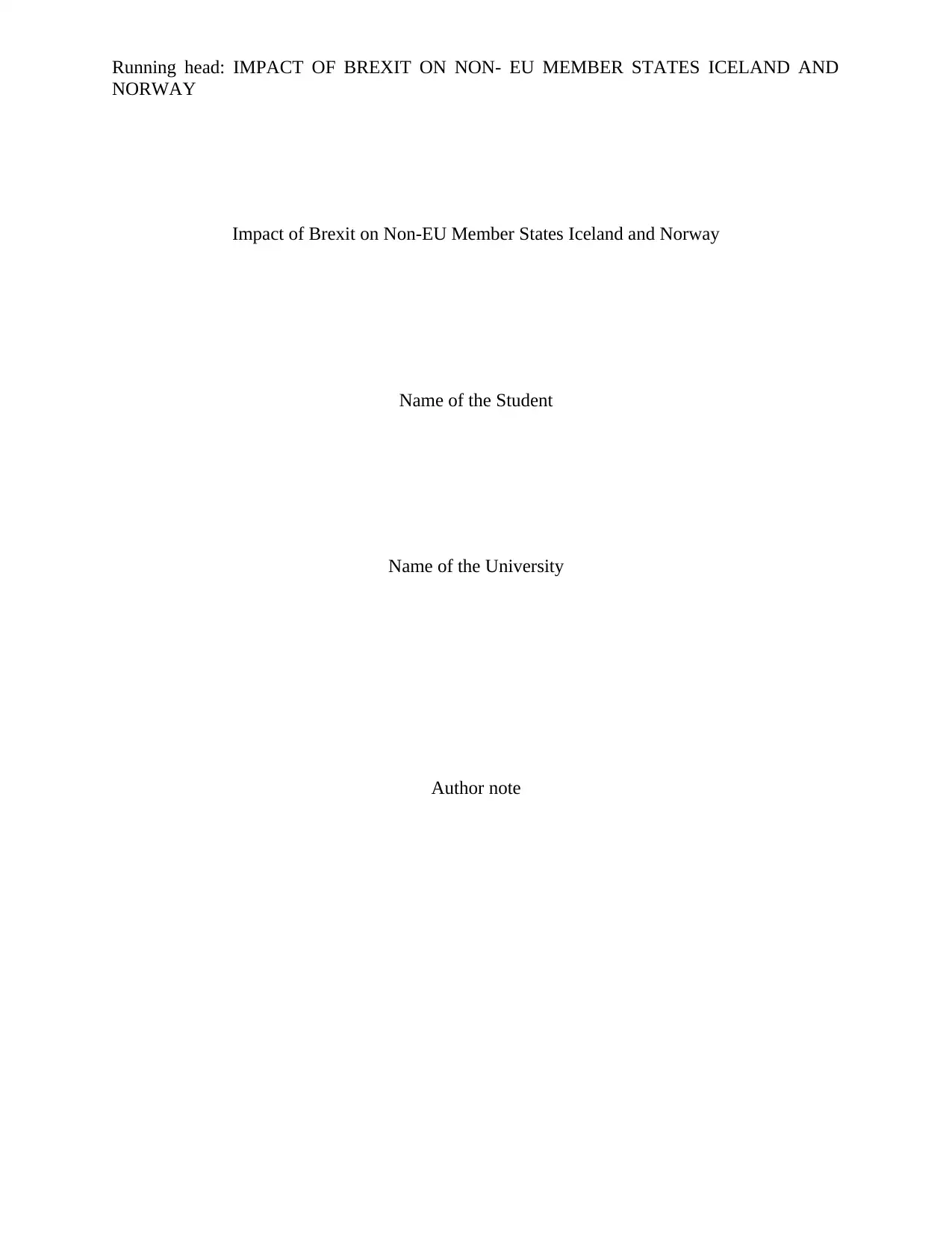
Running head: IMPACT OF BREXIT ON NON- EU MEMBER STATES ICELAND AND
NORWAY
Impact of Brexit on Non-EU Member States Iceland and Norway
Name of the Student
Name of the University
Author note
NORWAY
Impact of Brexit on Non-EU Member States Iceland and Norway
Name of the Student
Name of the University
Author note
Paraphrase This Document
Need a fresh take? Get an instant paraphrase of this document with our AI Paraphraser
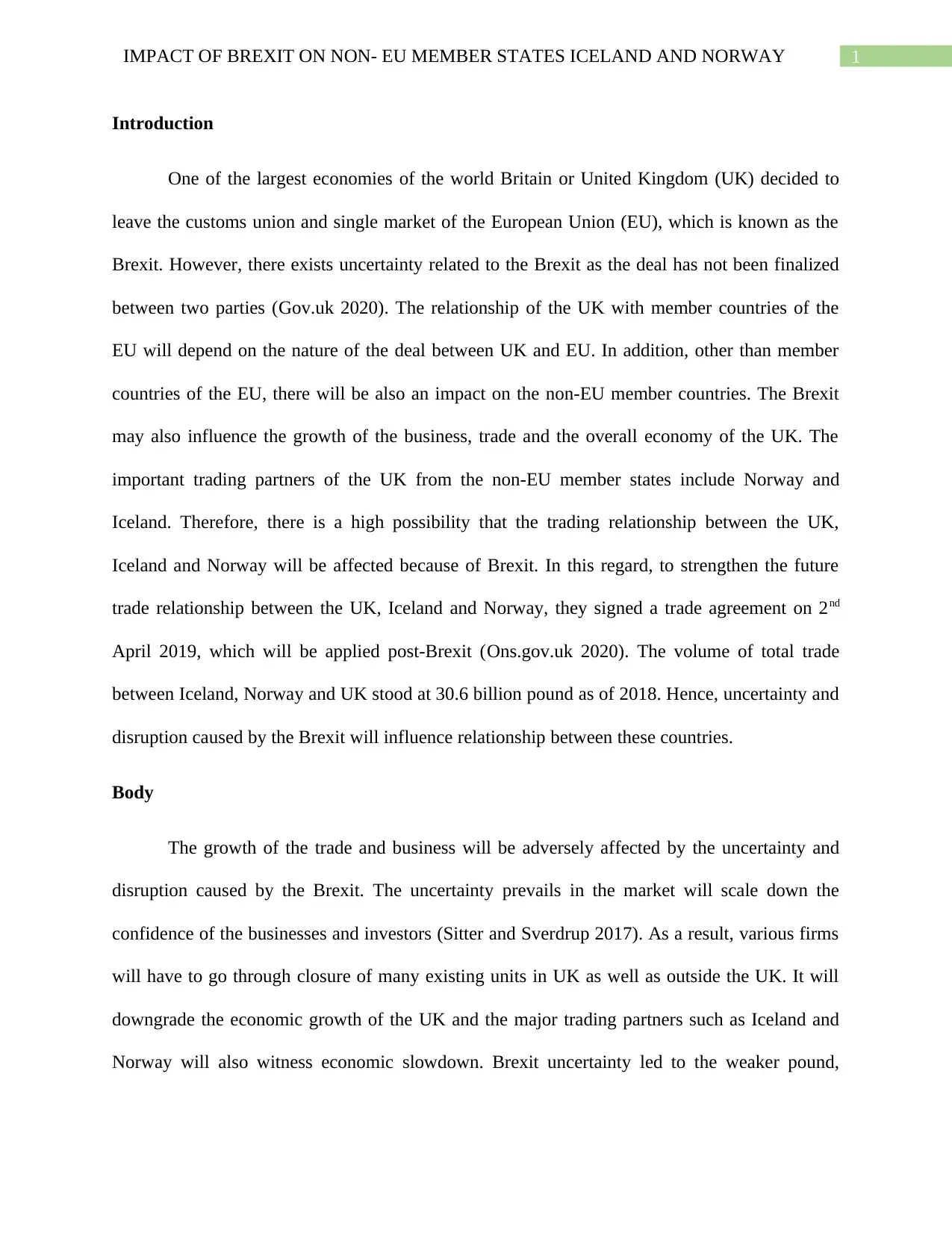
1IMPACT OF BREXIT ON NON- EU MEMBER STATES ICELAND AND NORWAY
Introduction
One of the largest economies of the world Britain or United Kingdom (UK) decided to
leave the customs union and single market of the European Union (EU), which is known as the
Brexit. However, there exists uncertainty related to the Brexit as the deal has not been finalized
between two parties (Gov.uk 2020). The relationship of the UK with member countries of the
EU will depend on the nature of the deal between UK and EU. In addition, other than member
countries of the EU, there will be also an impact on the non-EU member countries. The Brexit
may also influence the growth of the business, trade and the overall economy of the UK. The
important trading partners of the UK from the non-EU member states include Norway and
Iceland. Therefore, there is a high possibility that the trading relationship between the UK,
Iceland and Norway will be affected because of Brexit. In this regard, to strengthen the future
trade relationship between the UK, Iceland and Norway, they signed a trade agreement on 2nd
April 2019, which will be applied post-Brexit (Ons.gov.uk 2020). The volume of total trade
between Iceland, Norway and UK stood at 30.6 billion pound as of 2018. Hence, uncertainty and
disruption caused by the Brexit will influence relationship between these countries.
Body
The growth of the trade and business will be adversely affected by the uncertainty and
disruption caused by the Brexit. The uncertainty prevails in the market will scale down the
confidence of the businesses and investors (Sitter and Sverdrup 2017). As a result, various firms
will have to go through closure of many existing units in UK as well as outside the UK. It will
downgrade the economic growth of the UK and the major trading partners such as Iceland and
Norway will also witness economic slowdown. Brexit uncertainty led to the weaker pound,
Introduction
One of the largest economies of the world Britain or United Kingdom (UK) decided to
leave the customs union and single market of the European Union (EU), which is known as the
Brexit. However, there exists uncertainty related to the Brexit as the deal has not been finalized
between two parties (Gov.uk 2020). The relationship of the UK with member countries of the
EU will depend on the nature of the deal between UK and EU. In addition, other than member
countries of the EU, there will be also an impact on the non-EU member countries. The Brexit
may also influence the growth of the business, trade and the overall economy of the UK. The
important trading partners of the UK from the non-EU member states include Norway and
Iceland. Therefore, there is a high possibility that the trading relationship between the UK,
Iceland and Norway will be affected because of Brexit. In this regard, to strengthen the future
trade relationship between the UK, Iceland and Norway, they signed a trade agreement on 2nd
April 2019, which will be applied post-Brexit (Ons.gov.uk 2020). The volume of total trade
between Iceland, Norway and UK stood at 30.6 billion pound as of 2018. Hence, uncertainty and
disruption caused by the Brexit will influence relationship between these countries.
Body
The growth of the trade and business will be adversely affected by the uncertainty and
disruption caused by the Brexit. The uncertainty prevails in the market will scale down the
confidence of the businesses and investors (Sitter and Sverdrup 2017). As a result, various firms
will have to go through closure of many existing units in UK as well as outside the UK. It will
downgrade the economic growth of the UK and the major trading partners such as Iceland and
Norway will also witness economic slowdown. Brexit uncertainty led to the weaker pound,
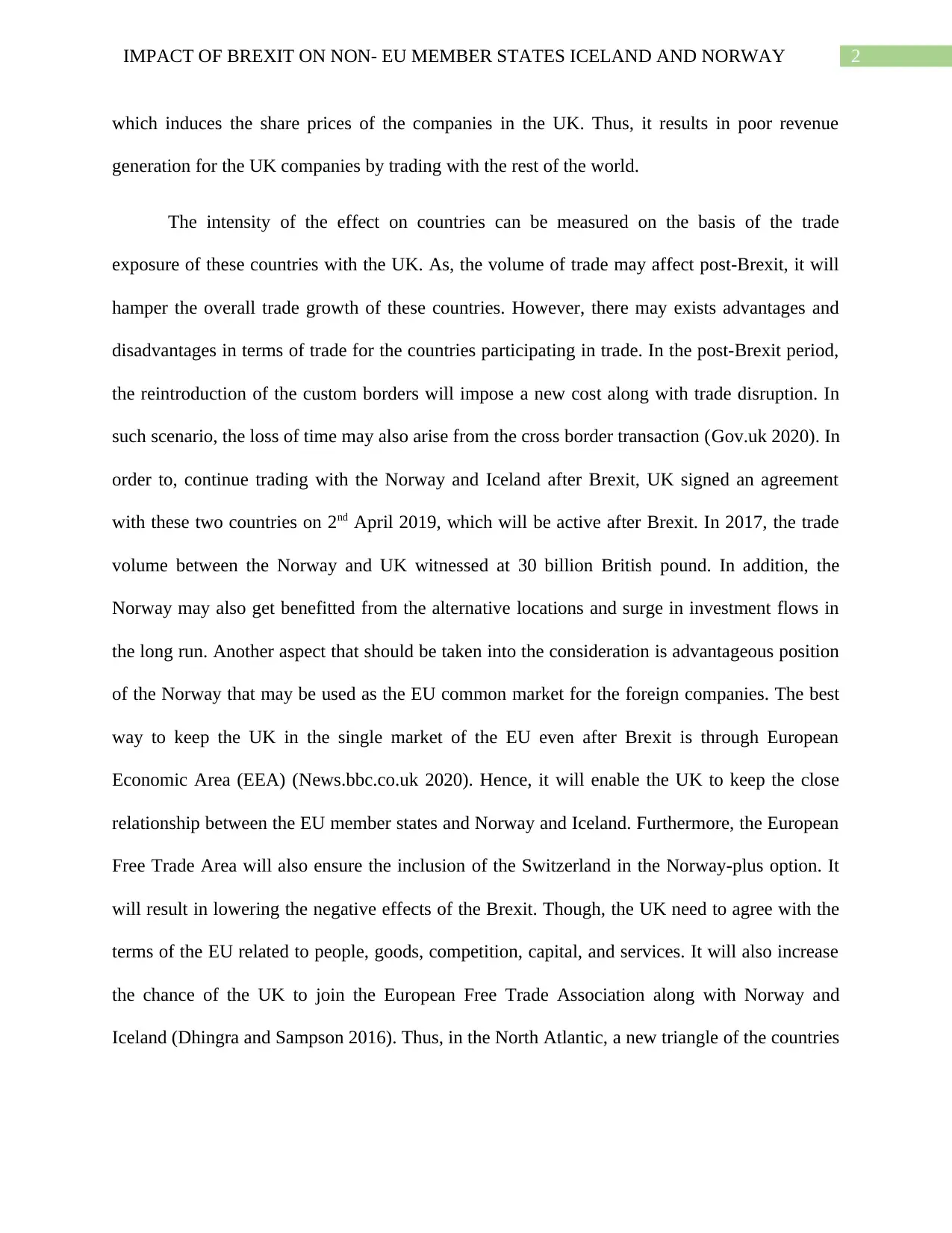
2IMPACT OF BREXIT ON NON- EU MEMBER STATES ICELAND AND NORWAY
which induces the share prices of the companies in the UK. Thus, it results in poor revenue
generation for the UK companies by trading with the rest of the world.
The intensity of the effect on countries can be measured on the basis of the trade
exposure of these countries with the UK. As, the volume of trade may affect post-Brexit, it will
hamper the overall trade growth of these countries. However, there may exists advantages and
disadvantages in terms of trade for the countries participating in trade. In the post-Brexit period,
the reintroduction of the custom borders will impose a new cost along with trade disruption. In
such scenario, the loss of time may also arise from the cross border transaction (Gov.uk 2020). In
order to, continue trading with the Norway and Iceland after Brexit, UK signed an agreement
with these two countries on 2nd April 2019, which will be active after Brexit. In 2017, the trade
volume between the Norway and UK witnessed at 30 billion British pound. In addition, the
Norway may also get benefitted from the alternative locations and surge in investment flows in
the long run. Another aspect that should be taken into the consideration is advantageous position
of the Norway that may be used as the EU common market for the foreign companies. The best
way to keep the UK in the single market of the EU even after Brexit is through European
Economic Area (EEA) (News.bbc.co.uk 2020). Hence, it will enable the UK to keep the close
relationship between the EU member states and Norway and Iceland. Furthermore, the European
Free Trade Area will also ensure the inclusion of the Switzerland in the Norway-plus option. It
will result in lowering the negative effects of the Brexit. Though, the UK need to agree with the
terms of the EU related to people, goods, competition, capital, and services. It will also increase
the chance of the UK to join the European Free Trade Association along with Norway and
Iceland (Dhingra and Sampson 2016). Thus, in the North Atlantic, a new triangle of the countries
which induces the share prices of the companies in the UK. Thus, it results in poor revenue
generation for the UK companies by trading with the rest of the world.
The intensity of the effect on countries can be measured on the basis of the trade
exposure of these countries with the UK. As, the volume of trade may affect post-Brexit, it will
hamper the overall trade growth of these countries. However, there may exists advantages and
disadvantages in terms of trade for the countries participating in trade. In the post-Brexit period,
the reintroduction of the custom borders will impose a new cost along with trade disruption. In
such scenario, the loss of time may also arise from the cross border transaction (Gov.uk 2020). In
order to, continue trading with the Norway and Iceland after Brexit, UK signed an agreement
with these two countries on 2nd April 2019, which will be active after Brexit. In 2017, the trade
volume between the Norway and UK witnessed at 30 billion British pound. In addition, the
Norway may also get benefitted from the alternative locations and surge in investment flows in
the long run. Another aspect that should be taken into the consideration is advantageous position
of the Norway that may be used as the EU common market for the foreign companies. The best
way to keep the UK in the single market of the EU even after Brexit is through European
Economic Area (EEA) (News.bbc.co.uk 2020). Hence, it will enable the UK to keep the close
relationship between the EU member states and Norway and Iceland. Furthermore, the European
Free Trade Area will also ensure the inclusion of the Switzerland in the Norway-plus option. It
will result in lowering the negative effects of the Brexit. Though, the UK need to agree with the
terms of the EU related to people, goods, competition, capital, and services. It will also increase
the chance of the UK to join the European Free Trade Association along with Norway and
Iceland (Dhingra and Sampson 2016). Thus, in the North Atlantic, a new triangle of the countries
⊘ This is a preview!⊘
Do you want full access?
Subscribe today to unlock all pages.

Trusted by 1+ million students worldwide
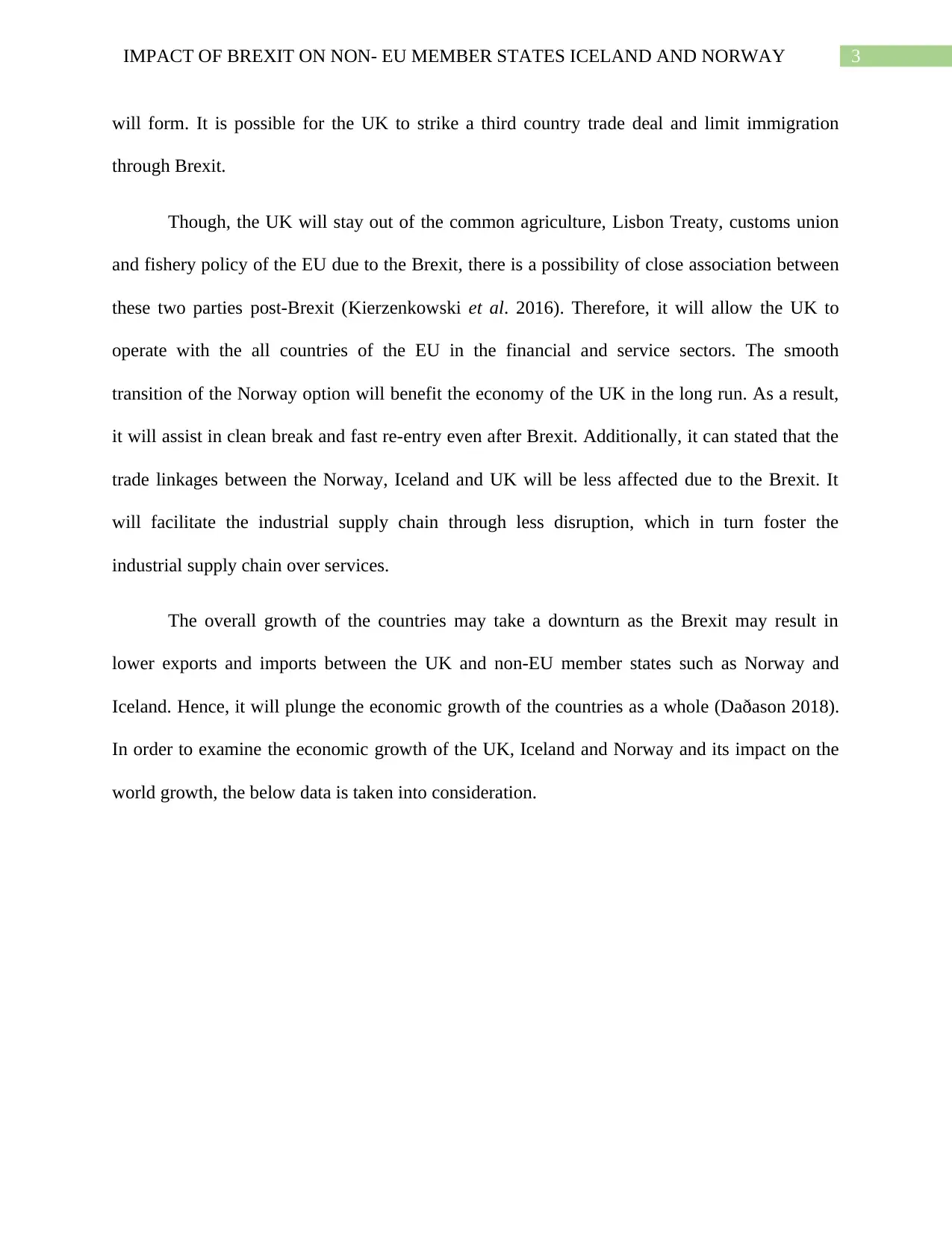
3IMPACT OF BREXIT ON NON- EU MEMBER STATES ICELAND AND NORWAY
will form. It is possible for the UK to strike a third country trade deal and limit immigration
through Brexit.
Though, the UK will stay out of the common agriculture, Lisbon Treaty, customs union
and fishery policy of the EU due to the Brexit, there is a possibility of close association between
these two parties post-Brexit (Kierzenkowski et al. 2016). Therefore, it will allow the UK to
operate with the all countries of the EU in the financial and service sectors. The smooth
transition of the Norway option will benefit the economy of the UK in the long run. As a result,
it will assist in clean break and fast re-entry even after Brexit. Additionally, it can stated that the
trade linkages between the Norway, Iceland and UK will be less affected due to the Brexit. It
will facilitate the industrial supply chain through less disruption, which in turn foster the
industrial supply chain over services.
The overall growth of the countries may take a downturn as the Brexit may result in
lower exports and imports between the UK and non-EU member states such as Norway and
Iceland. Hence, it will plunge the economic growth of the countries as a whole (Daðason 2018).
In order to examine the economic growth of the UK, Iceland and Norway and its impact on the
world growth, the below data is taken into consideration.
will form. It is possible for the UK to strike a third country trade deal and limit immigration
through Brexit.
Though, the UK will stay out of the common agriculture, Lisbon Treaty, customs union
and fishery policy of the EU due to the Brexit, there is a possibility of close association between
these two parties post-Brexit (Kierzenkowski et al. 2016). Therefore, it will allow the UK to
operate with the all countries of the EU in the financial and service sectors. The smooth
transition of the Norway option will benefit the economy of the UK in the long run. As a result,
it will assist in clean break and fast re-entry even after Brexit. Additionally, it can stated that the
trade linkages between the Norway, Iceland and UK will be less affected due to the Brexit. It
will facilitate the industrial supply chain through less disruption, which in turn foster the
industrial supply chain over services.
The overall growth of the countries may take a downturn as the Brexit may result in
lower exports and imports between the UK and non-EU member states such as Norway and
Iceland. Hence, it will plunge the economic growth of the countries as a whole (Daðason 2018).
In order to examine the economic growth of the UK, Iceland and Norway and its impact on the
world growth, the below data is taken into consideration.
Paraphrase This Document
Need a fresh take? Get an instant paraphrase of this document with our AI Paraphraser
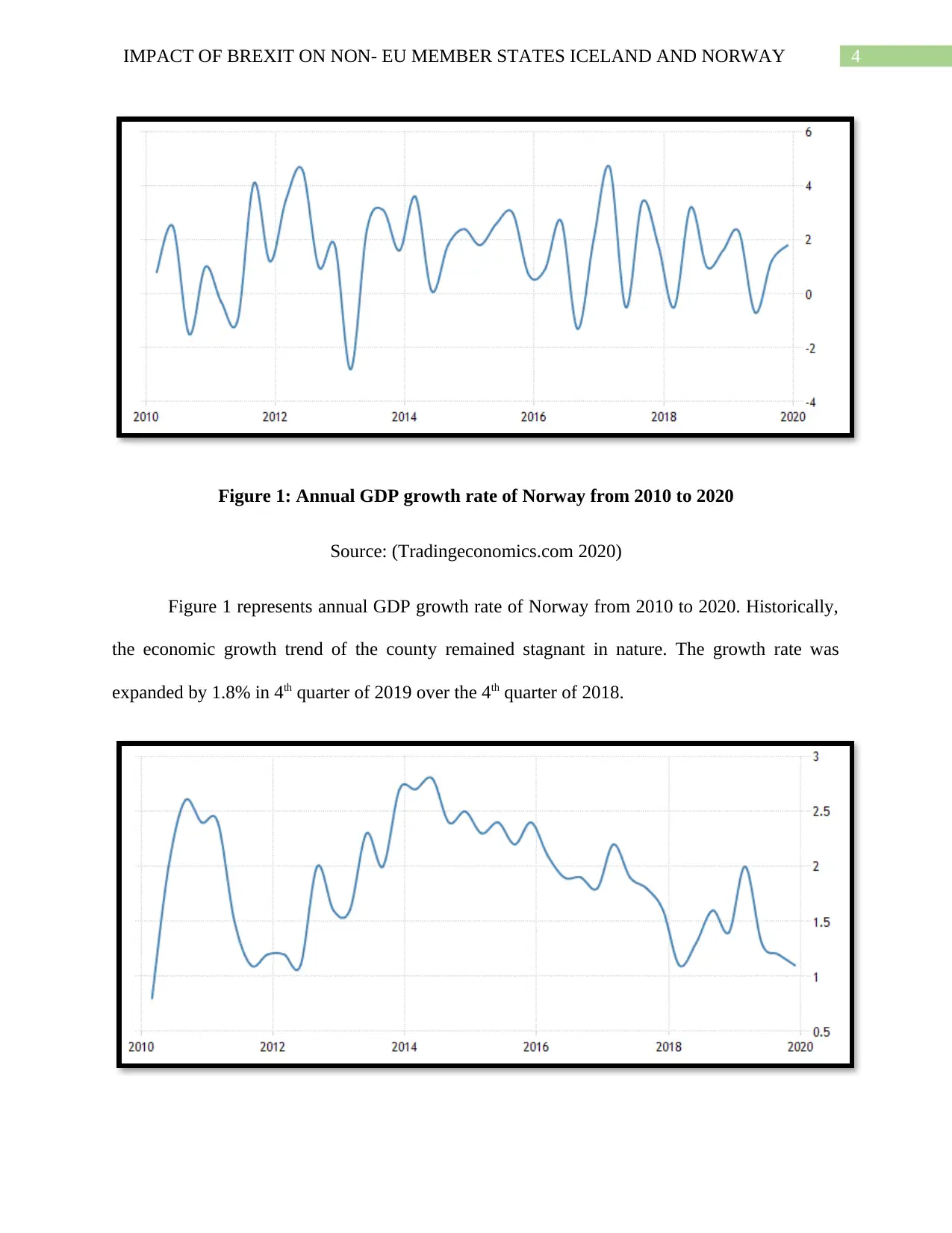
4IMPACT OF BREXIT ON NON- EU MEMBER STATES ICELAND AND NORWAY
Figure 1: Annual GDP growth rate of Norway from 2010 to 2020
Source: (Tradingeconomics.com 2020)
Figure 1 represents annual GDP growth rate of Norway from 2010 to 2020. Historically,
the economic growth trend of the county remained stagnant in nature. The growth rate was
expanded by 1.8% in 4th quarter of 2019 over the 4th quarter of 2018.
Figure 1: Annual GDP growth rate of Norway from 2010 to 2020
Source: (Tradingeconomics.com 2020)
Figure 1 represents annual GDP growth rate of Norway from 2010 to 2020. Historically,
the economic growth trend of the county remained stagnant in nature. The growth rate was
expanded by 1.8% in 4th quarter of 2019 over the 4th quarter of 2018.
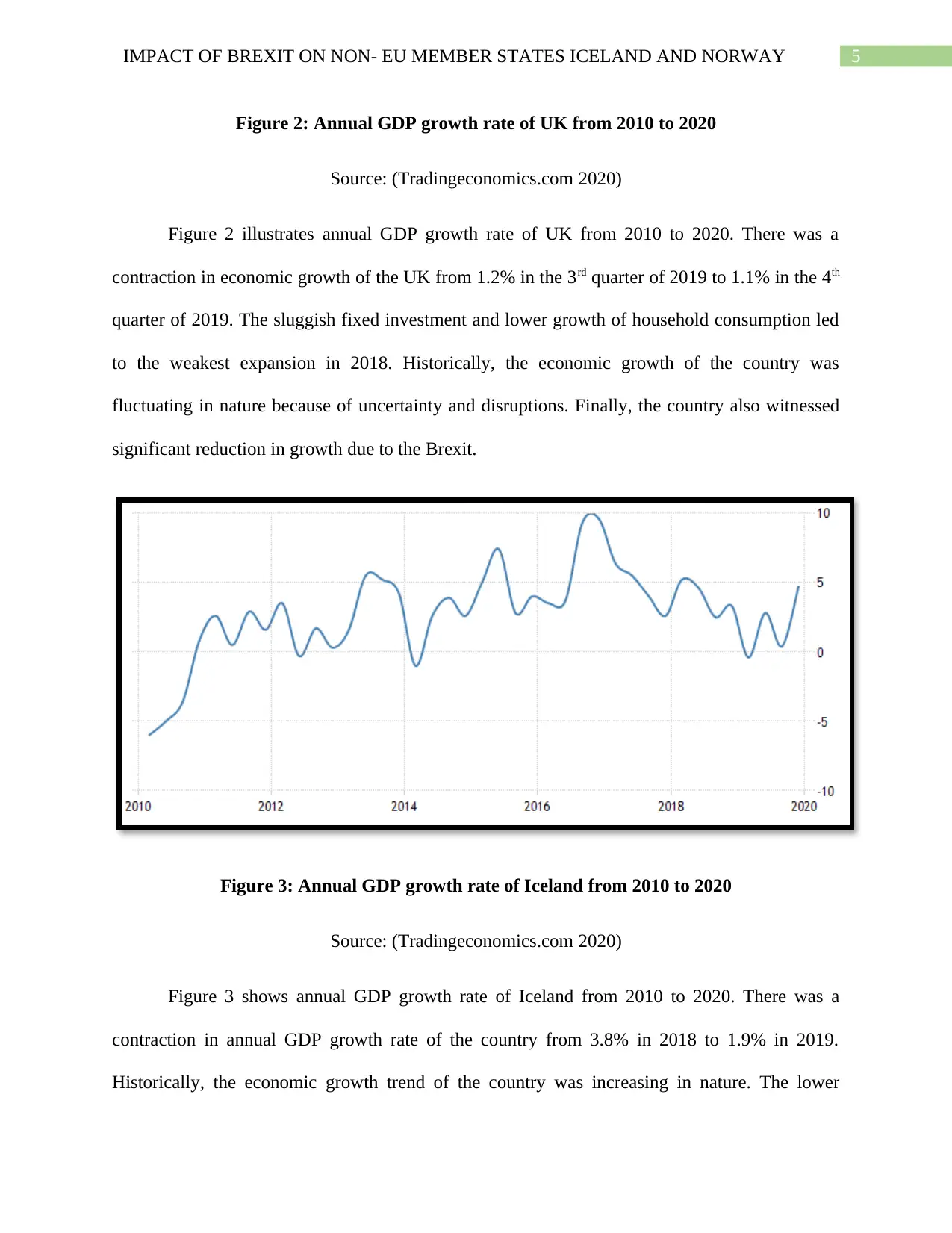
5IMPACT OF BREXIT ON NON- EU MEMBER STATES ICELAND AND NORWAY
Figure 2: Annual GDP growth rate of UK from 2010 to 2020
Source: (Tradingeconomics.com 2020)
Figure 2 illustrates annual GDP growth rate of UK from 2010 to 2020. There was a
contraction in economic growth of the UK from 1.2% in the 3rd quarter of 2019 to 1.1% in the 4th
quarter of 2019. The sluggish fixed investment and lower growth of household consumption led
to the weakest expansion in 2018. Historically, the economic growth of the country was
fluctuating in nature because of uncertainty and disruptions. Finally, the country also witnessed
significant reduction in growth due to the Brexit.
Figure 3: Annual GDP growth rate of Iceland from 2010 to 2020
Source: (Tradingeconomics.com 2020)
Figure 3 shows annual GDP growth rate of Iceland from 2010 to 2020. There was a
contraction in annual GDP growth rate of the country from 3.8% in 2018 to 1.9% in 2019.
Historically, the economic growth trend of the country was increasing in nature. The lower
Figure 2: Annual GDP growth rate of UK from 2010 to 2020
Source: (Tradingeconomics.com 2020)
Figure 2 illustrates annual GDP growth rate of UK from 2010 to 2020. There was a
contraction in economic growth of the UK from 1.2% in the 3rd quarter of 2019 to 1.1% in the 4th
quarter of 2019. The sluggish fixed investment and lower growth of household consumption led
to the weakest expansion in 2018. Historically, the economic growth of the country was
fluctuating in nature because of uncertainty and disruptions. Finally, the country also witnessed
significant reduction in growth due to the Brexit.
Figure 3: Annual GDP growth rate of Iceland from 2010 to 2020
Source: (Tradingeconomics.com 2020)
Figure 3 shows annual GDP growth rate of Iceland from 2010 to 2020. There was a
contraction in annual GDP growth rate of the country from 3.8% in 2018 to 1.9% in 2019.
Historically, the economic growth trend of the country was increasing in nature. The lower
⊘ This is a preview!⊘
Do you want full access?
Subscribe today to unlock all pages.

Trusted by 1+ million students worldwide
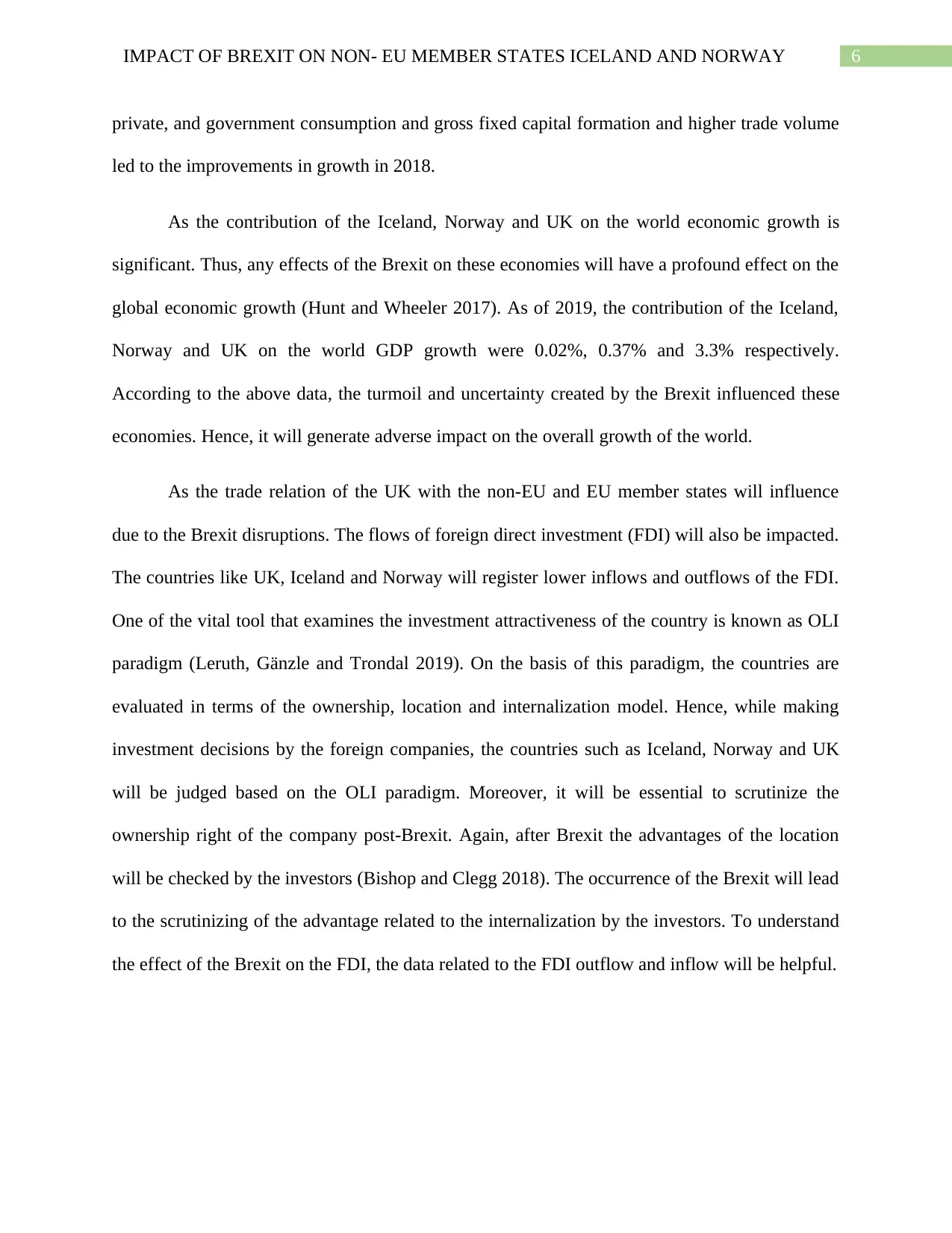
6IMPACT OF BREXIT ON NON- EU MEMBER STATES ICELAND AND NORWAY
private, and government consumption and gross fixed capital formation and higher trade volume
led to the improvements in growth in 2018.
As the contribution of the Iceland, Norway and UK on the world economic growth is
significant. Thus, any effects of the Brexit on these economies will have a profound effect on the
global economic growth (Hunt and Wheeler 2017). As of 2019, the contribution of the Iceland,
Norway and UK on the world GDP growth were 0.02%, 0.37% and 3.3% respectively.
According to the above data, the turmoil and uncertainty created by the Brexit influenced these
economies. Hence, it will generate adverse impact on the overall growth of the world.
As the trade relation of the UK with the non-EU and EU member states will influence
due to the Brexit disruptions. The flows of foreign direct investment (FDI) will also be impacted.
The countries like UK, Iceland and Norway will register lower inflows and outflows of the FDI.
One of the vital tool that examines the investment attractiveness of the country is known as OLI
paradigm (Leruth, Gänzle and Trondal 2019). On the basis of this paradigm, the countries are
evaluated in terms of the ownership, location and internalization model. Hence, while making
investment decisions by the foreign companies, the countries such as Iceland, Norway and UK
will be judged based on the OLI paradigm. Moreover, it will be essential to scrutinize the
ownership right of the company post-Brexit. Again, after Brexit the advantages of the location
will be checked by the investors (Bishop and Clegg 2018). The occurrence of the Brexit will lead
to the scrutinizing of the advantage related to the internalization by the investors. To understand
the effect of the Brexit on the FDI, the data related to the FDI outflow and inflow will be helpful.
private, and government consumption and gross fixed capital formation and higher trade volume
led to the improvements in growth in 2018.
As the contribution of the Iceland, Norway and UK on the world economic growth is
significant. Thus, any effects of the Brexit on these economies will have a profound effect on the
global economic growth (Hunt and Wheeler 2017). As of 2019, the contribution of the Iceland,
Norway and UK on the world GDP growth were 0.02%, 0.37% and 3.3% respectively.
According to the above data, the turmoil and uncertainty created by the Brexit influenced these
economies. Hence, it will generate adverse impact on the overall growth of the world.
As the trade relation of the UK with the non-EU and EU member states will influence
due to the Brexit disruptions. The flows of foreign direct investment (FDI) will also be impacted.
The countries like UK, Iceland and Norway will register lower inflows and outflows of the FDI.
One of the vital tool that examines the investment attractiveness of the country is known as OLI
paradigm (Leruth, Gänzle and Trondal 2019). On the basis of this paradigm, the countries are
evaluated in terms of the ownership, location and internalization model. Hence, while making
investment decisions by the foreign companies, the countries such as Iceland, Norway and UK
will be judged based on the OLI paradigm. Moreover, it will be essential to scrutinize the
ownership right of the company post-Brexit. Again, after Brexit the advantages of the location
will be checked by the investors (Bishop and Clegg 2018). The occurrence of the Brexit will lead
to the scrutinizing of the advantage related to the internalization by the investors. To understand
the effect of the Brexit on the FDI, the data related to the FDI outflow and inflow will be helpful.
Paraphrase This Document
Need a fresh take? Get an instant paraphrase of this document with our AI Paraphraser
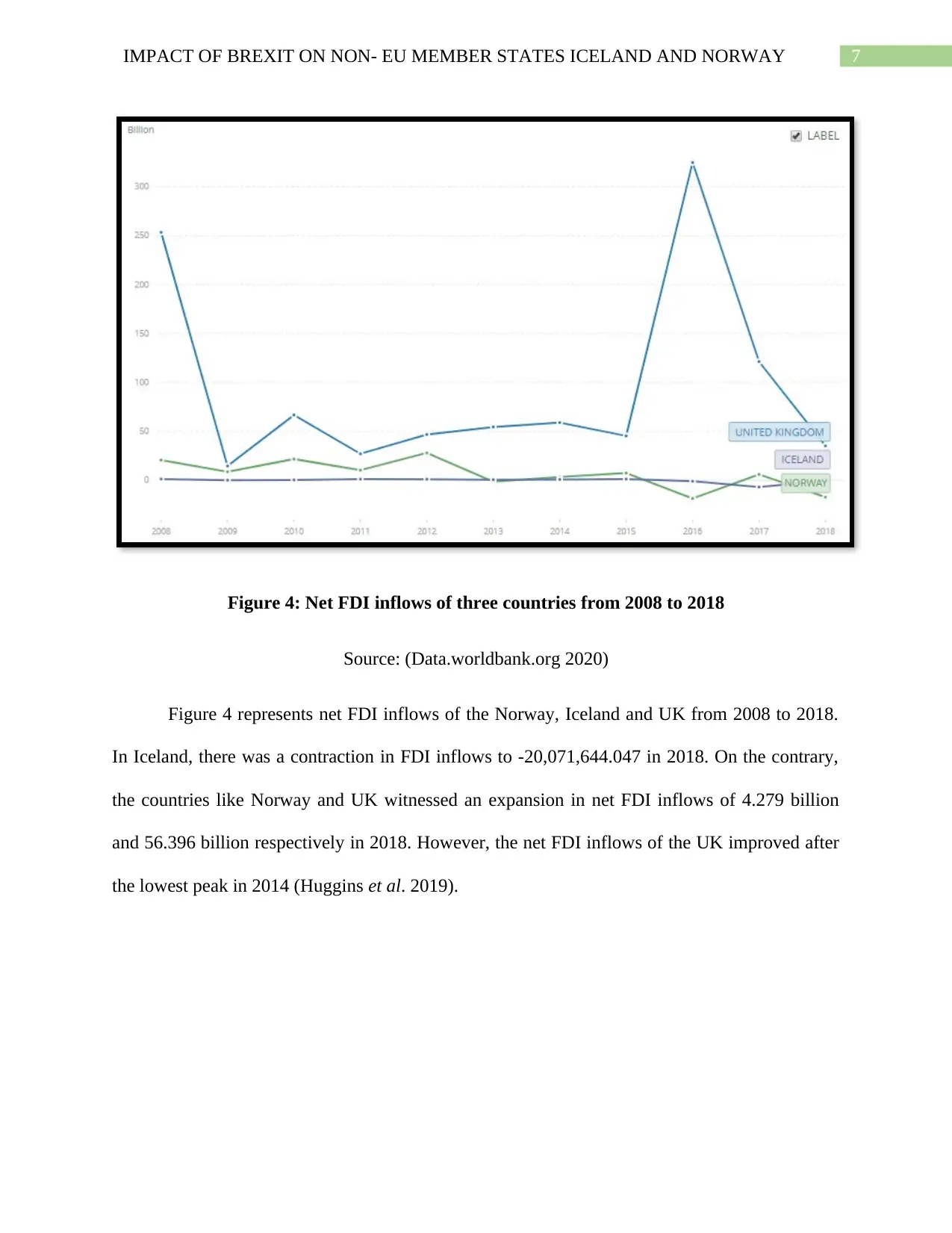
7IMPACT OF BREXIT ON NON- EU MEMBER STATES ICELAND AND NORWAY
Figure 4: Net FDI inflows of three countries from 2008 to 2018
Source: (Data.worldbank.org 2020)
Figure 4 represents net FDI inflows of the Norway, Iceland and UK from 2008 to 2018.
In Iceland, there was a contraction in FDI inflows to -20,071,644.047 in 2018. On the contrary,
the countries like Norway and UK witnessed an expansion in net FDI inflows of 4.279 billion
and 56.396 billion respectively in 2018. However, the net FDI inflows of the UK improved after
the lowest peak in 2014 (Huggins et al. 2019).
Figure 4: Net FDI inflows of three countries from 2008 to 2018
Source: (Data.worldbank.org 2020)
Figure 4 represents net FDI inflows of the Norway, Iceland and UK from 2008 to 2018.
In Iceland, there was a contraction in FDI inflows to -20,071,644.047 in 2018. On the contrary,
the countries like Norway and UK witnessed an expansion in net FDI inflows of 4.279 billion
and 56.396 billion respectively in 2018. However, the net FDI inflows of the UK improved after
the lowest peak in 2014 (Huggins et al. 2019).
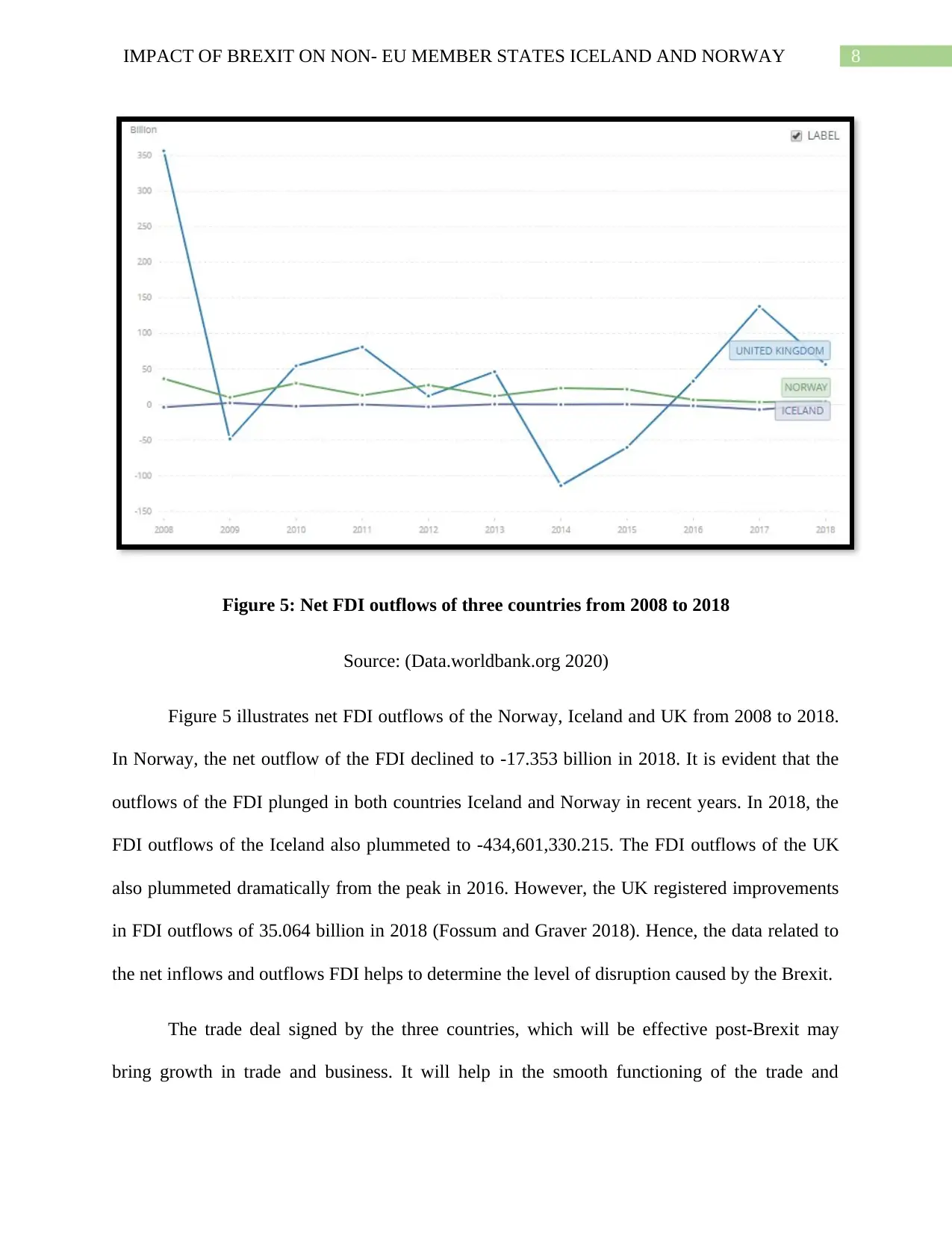
8IMPACT OF BREXIT ON NON- EU MEMBER STATES ICELAND AND NORWAY
Figure 5: Net FDI outflows of three countries from 2008 to 2018
Source: (Data.worldbank.org 2020)
Figure 5 illustrates net FDI outflows of the Norway, Iceland and UK from 2008 to 2018.
In Norway, the net outflow of the FDI declined to -17.353 billion in 2018. It is evident that the
outflows of the FDI plunged in both countries Iceland and Norway in recent years. In 2018, the
FDI outflows of the Iceland also plummeted to -434,601,330.215. The FDI outflows of the UK
also plummeted dramatically from the peak in 2016. However, the UK registered improvements
in FDI outflows of 35.064 billion in 2018 (Fossum and Graver 2018). Hence, the data related to
the net inflows and outflows FDI helps to determine the level of disruption caused by the Brexit.
The trade deal signed by the three countries, which will be effective post-Brexit may
bring growth in trade and business. It will help in the smooth functioning of the trade and
Figure 5: Net FDI outflows of three countries from 2008 to 2018
Source: (Data.worldbank.org 2020)
Figure 5 illustrates net FDI outflows of the Norway, Iceland and UK from 2008 to 2018.
In Norway, the net outflow of the FDI declined to -17.353 billion in 2018. It is evident that the
outflows of the FDI plunged in both countries Iceland and Norway in recent years. In 2018, the
FDI outflows of the Iceland also plummeted to -434,601,330.215. The FDI outflows of the UK
also plummeted dramatically from the peak in 2016. However, the UK registered improvements
in FDI outflows of 35.064 billion in 2018 (Fossum and Graver 2018). Hence, the data related to
the net inflows and outflows FDI helps to determine the level of disruption caused by the Brexit.
The trade deal signed by the three countries, which will be effective post-Brexit may
bring growth in trade and business. It will help in the smooth functioning of the trade and
⊘ This is a preview!⊘
Do you want full access?
Subscribe today to unlock all pages.

Trusted by 1+ million students worldwide
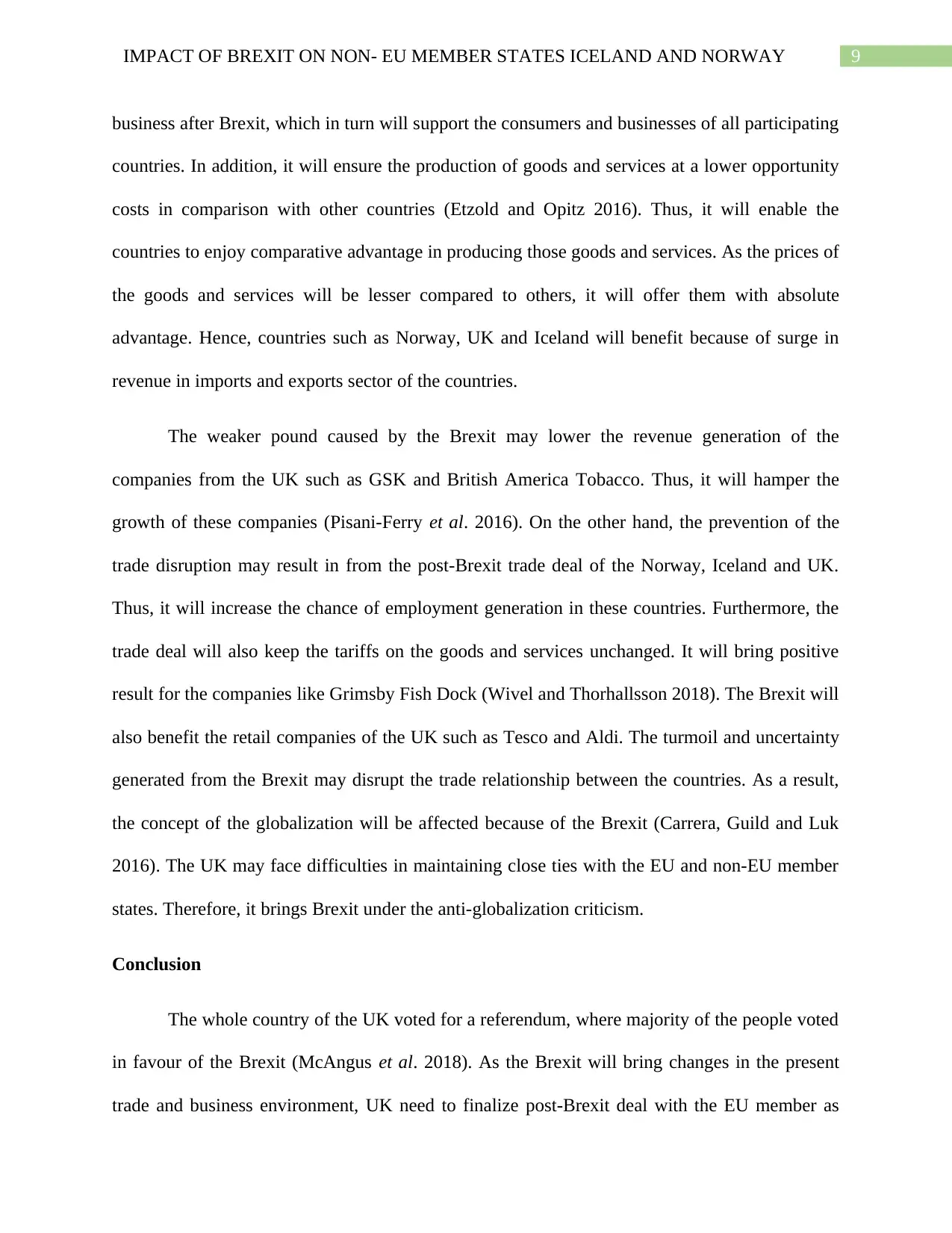
9IMPACT OF BREXIT ON NON- EU MEMBER STATES ICELAND AND NORWAY
business after Brexit, which in turn will support the consumers and businesses of all participating
countries. In addition, it will ensure the production of goods and services at a lower opportunity
costs in comparison with other countries (Etzold and Opitz 2016). Thus, it will enable the
countries to enjoy comparative advantage in producing those goods and services. As the prices of
the goods and services will be lesser compared to others, it will offer them with absolute
advantage. Hence, countries such as Norway, UK and Iceland will benefit because of surge in
revenue in imports and exports sector of the countries.
The weaker pound caused by the Brexit may lower the revenue generation of the
companies from the UK such as GSK and British America Tobacco. Thus, it will hamper the
growth of these companies (Pisani-Ferry et al. 2016). On the other hand, the prevention of the
trade disruption may result in from the post-Brexit trade deal of the Norway, Iceland and UK.
Thus, it will increase the chance of employment generation in these countries. Furthermore, the
trade deal will also keep the tariffs on the goods and services unchanged. It will bring positive
result for the companies like Grimsby Fish Dock (Wivel and Thorhallsson 2018). The Brexit will
also benefit the retail companies of the UK such as Tesco and Aldi. The turmoil and uncertainty
generated from the Brexit may disrupt the trade relationship between the countries. As a result,
the concept of the globalization will be affected because of the Brexit (Carrera, Guild and Luk
2016). The UK may face difficulties in maintaining close ties with the EU and non-EU member
states. Therefore, it brings Brexit under the anti-globalization criticism.
Conclusion
The whole country of the UK voted for a referendum, where majority of the people voted
in favour of the Brexit (McAngus et al. 2018). As the Brexit will bring changes in the present
trade and business environment, UK need to finalize post-Brexit deal with the EU member as
business after Brexit, which in turn will support the consumers and businesses of all participating
countries. In addition, it will ensure the production of goods and services at a lower opportunity
costs in comparison with other countries (Etzold and Opitz 2016). Thus, it will enable the
countries to enjoy comparative advantage in producing those goods and services. As the prices of
the goods and services will be lesser compared to others, it will offer them with absolute
advantage. Hence, countries such as Norway, UK and Iceland will benefit because of surge in
revenue in imports and exports sector of the countries.
The weaker pound caused by the Brexit may lower the revenue generation of the
companies from the UK such as GSK and British America Tobacco. Thus, it will hamper the
growth of these companies (Pisani-Ferry et al. 2016). On the other hand, the prevention of the
trade disruption may result in from the post-Brexit trade deal of the Norway, Iceland and UK.
Thus, it will increase the chance of employment generation in these countries. Furthermore, the
trade deal will also keep the tariffs on the goods and services unchanged. It will bring positive
result for the companies like Grimsby Fish Dock (Wivel and Thorhallsson 2018). The Brexit will
also benefit the retail companies of the UK such as Tesco and Aldi. The turmoil and uncertainty
generated from the Brexit may disrupt the trade relationship between the countries. As a result,
the concept of the globalization will be affected because of the Brexit (Carrera, Guild and Luk
2016). The UK may face difficulties in maintaining close ties with the EU and non-EU member
states. Therefore, it brings Brexit under the anti-globalization criticism.
Conclusion
The whole country of the UK voted for a referendum, where majority of the people voted
in favour of the Brexit (McAngus et al. 2018). As the Brexit will bring changes in the present
trade and business environment, UK need to finalize post-Brexit deal with the EU member as
Paraphrase This Document
Need a fresh take? Get an instant paraphrase of this document with our AI Paraphraser
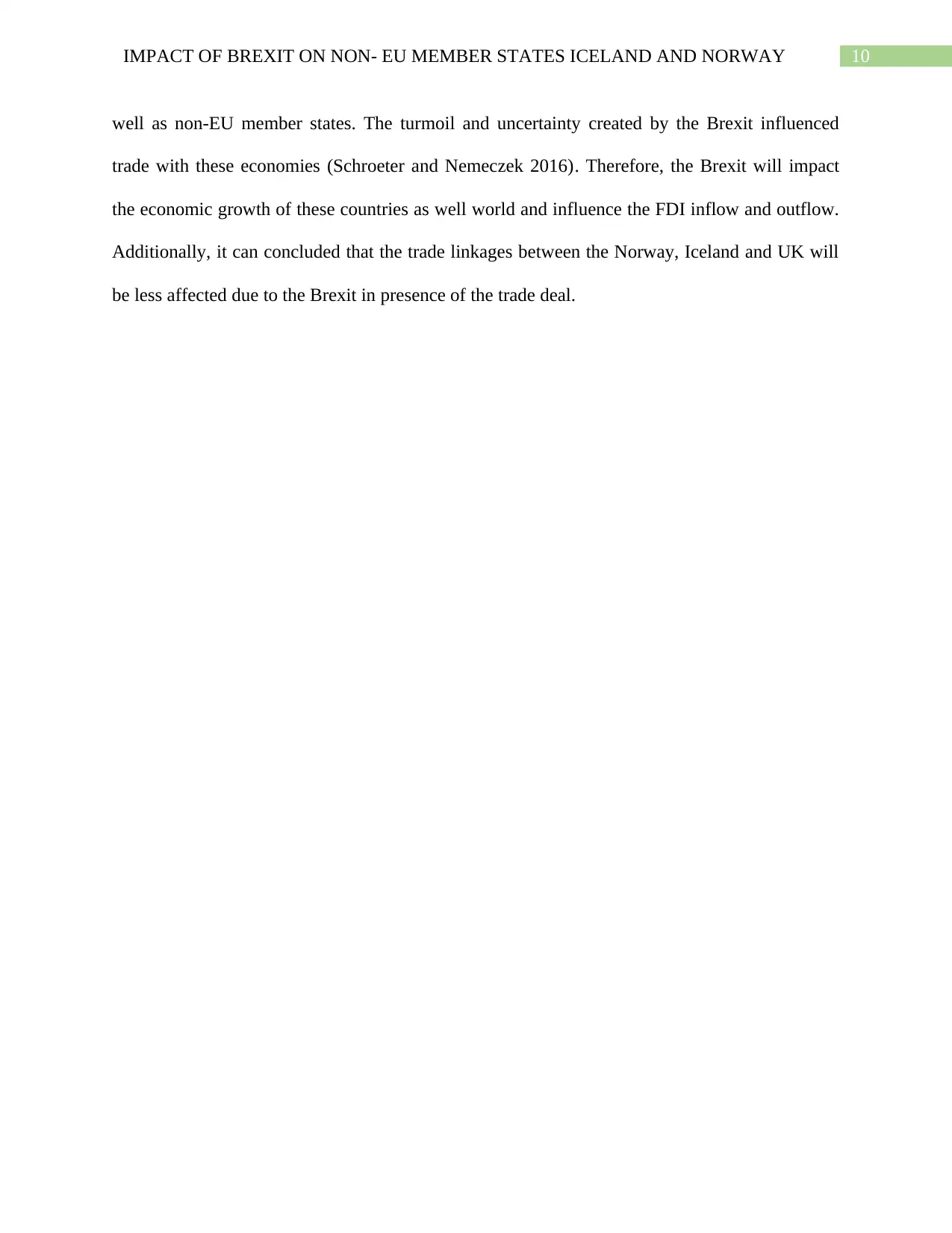
10IMPACT OF BREXIT ON NON- EU MEMBER STATES ICELAND AND NORWAY
well as non-EU member states. The turmoil and uncertainty created by the Brexit influenced
trade with these economies (Schroeter and Nemeczek 2016). Therefore, the Brexit will impact
the economic growth of these countries as well world and influence the FDI inflow and outflow.
Additionally, it can concluded that the trade linkages between the Norway, Iceland and UK will
be less affected due to the Brexit in presence of the trade deal.
well as non-EU member states. The turmoil and uncertainty created by the Brexit influenced
trade with these economies (Schroeter and Nemeczek 2016). Therefore, the Brexit will impact
the economic growth of these countries as well world and influence the FDI inflow and outflow.
Additionally, it can concluded that the trade linkages between the Norway, Iceland and UK will
be less affected due to the Brexit in presence of the trade deal.

11IMPACT OF BREXIT ON NON- EU MEMBER STATES ICELAND AND NORWAY
References
Bishop, M.L. and Clegg, P., 2018. Brexit: Challenges and opportunities for small Countries and
territories. The round table, 107(3), pp.329-339.
Carrera, S., Guild, E. and Luk, N.C., 2016. What Does Brexit Mean for the EU's Area of
Freedom, Security and Justice?
Daðason, V., 2018. Iceland, UK and Brexit: How can Iceland and the UK make a better trade
deal in lieu of Brexit?
Data.worldbank.org. 2020. Foreign direct investment, net inflows (BoP, current US$) | Data.
[online] Available at: https://data.worldbank.org/indicator/BX.KLT.DINV.CD.WD.
Dhingra, S. and Sampson, T., 2016. Life after BREXIT: What are the UK’s options outside the
European Union?
Etzold, T. and Opitz, C., 2016. Nordic Europe after the Brexit vote: the five Nordic countries are
reassessing their relations with the EU.
Fossum, J.E. and Graver, H.P., 2018. Squaring the circle on Brexit: Could the Norway model
work?. Policy Press.
Gov.uk 2020. Department for International Trade. [online] Available at:
https://www.gov.uk/government/organisations/department-for-international-trade.
Huggins, C., Connolly, J., McAngus, C. and Van Der Zwet, A., 2019. Brexit and the future of
UK fisheries governance: learning lessons from Iceland, Norway and the Faroe
Islands. Contemporary Social Science, 14(2), pp.327-340.
References
Bishop, M.L. and Clegg, P., 2018. Brexit: Challenges and opportunities for small Countries and
territories. The round table, 107(3), pp.329-339.
Carrera, S., Guild, E. and Luk, N.C., 2016. What Does Brexit Mean for the EU's Area of
Freedom, Security and Justice?
Daðason, V., 2018. Iceland, UK and Brexit: How can Iceland and the UK make a better trade
deal in lieu of Brexit?
Data.worldbank.org. 2020. Foreign direct investment, net inflows (BoP, current US$) | Data.
[online] Available at: https://data.worldbank.org/indicator/BX.KLT.DINV.CD.WD.
Dhingra, S. and Sampson, T., 2016. Life after BREXIT: What are the UK’s options outside the
European Union?
Etzold, T. and Opitz, C., 2016. Nordic Europe after the Brexit vote: the five Nordic countries are
reassessing their relations with the EU.
Fossum, J.E. and Graver, H.P., 2018. Squaring the circle on Brexit: Could the Norway model
work?. Policy Press.
Gov.uk 2020. Department for International Trade. [online] Available at:
https://www.gov.uk/government/organisations/department-for-international-trade.
Huggins, C., Connolly, J., McAngus, C. and Van Der Zwet, A., 2019. Brexit and the future of
UK fisheries governance: learning lessons from Iceland, Norway and the Faroe
Islands. Contemporary Social Science, 14(2), pp.327-340.
⊘ This is a preview!⊘
Do you want full access?
Subscribe today to unlock all pages.

Trusted by 1+ million students worldwide
1 out of 14
Related Documents
Your All-in-One AI-Powered Toolkit for Academic Success.
+13062052269
info@desklib.com
Available 24*7 on WhatsApp / Email
![[object Object]](/_next/static/media/star-bottom.7253800d.svg)
Unlock your academic potential
Copyright © 2020–2026 A2Z Services. All Rights Reserved. Developed and managed by ZUCOL.





